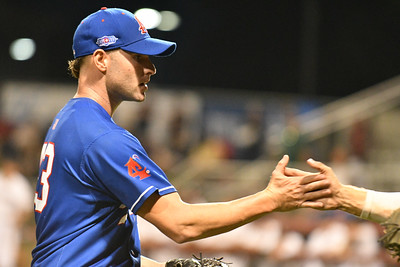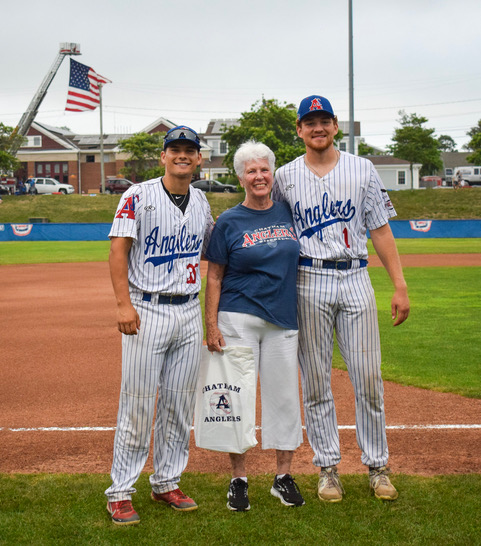Anglers News« Back to 2021 News Archives |
How Daniel Federman learned a 4-pitch mix and landed a deal with the Orioles

Daniel Federman spent three days in mid-July perched in his living room, waiting ' cell phone by his side or in his hands ' as 30 MLB teams selected 609 players. He wanted to hear his name, or get a phone call, something that indicated he was right to bet on himself.
Everything that happened over the past 13 months built up to this point. The five-round draft in 2020. The undrafted tag that followed Federman into his senior year at Miami. The Friday-night-starter role, then the Sunday-afternoon-reliever one, and finally a three-appearance stretch in Chatham that boosted his stock entering the pivotal stretch from July 11 to 13. He took calculated risks at each step, especially the last one after an inconsistent season at Miami. But the return on those investments, the strides Federman had made since, brought him on the cusp of a professional career that'd evaded him so far.
He went undrafted a second time, but the Baltimore Orioles, among other teams, called within 15 minutes of its conclusion. At one end was Federman, still in the living room with his parents. At the other end of those calls was general manager Mike Elias and High-A pitching coach Josh Conway. And what they settled on relieved Federman's stress ' he could shoulder the burden of going undrafted again in exchange for more money and the ability to pick his destination. A fastball peaking at 93 could creep closer to 95 with the right offseason plan. A cerebral approach to pitching, the result of needing to win at-bats with precise pitch selection and even more precise pitch location, could be sharpened.
Last year, at the conclusion of a shortened MLB Draft when he hadn't heard his name called, Federman left the same living room with his parents, turned on the elliptical in the garage of their Pembroke Pines, Florida, home and burrowed himself into the repetitive movements for the next hour. He was 'distraught,' David Federman, his father, said, and stayed that way until the next morning, when Federman woke up, smiled and told his parents that going undrafted was a 'blessing' and he knew he'd still, eventually, land a professional opportunity.
That next stage started in Sarasota, Florida, where he drove his car to on Monday, moved into his extended-stay room, and reported for a physical and initial workouts at Baltimore's spring training homebase to determine his next destination. It could be Low-A in Salisbury Maryland with the Delmarva Shorebirds. It could be high-A in Harford County with the Aberdeen Ironbirds. But at either level, it'll reflect the latest stride in Federman's career, the biggest one after becoming a four-pitch thrower in four seasons at Miami and two summers in Chatham ' utilizing his lower velocity to his advantage by pairing it with a multitude of breaking balls.
'I'm staying in shape and ready to go wherever they send me,' Federman said. 'It doesn't matter to me. I'm ready to go.'
He capped off his two-week stretch in Chatham this season with three innings against Yarmouth-Dennis on July 2, where he allowed his first earned run of the season, before returning to Florida for pre-draft workouts. One stop involved an hour-long drive to West Palm Beach, where he threw a bullpen session for the Houston Astros at their facility. It was Federman and about 20 other people, some from as far as Puerto Rico or Pennsylvania, throwing for the front office staff, mixing in sequences like two fastballs arm side or two fastballs glove side with two changeups or two sliders ' trying to execute each pitch for those Astros staffers, guys that 'change your life,' standing nearby.
Federman knew every pitch wouldn't land perfectly. That was impossible, and something he learned at a young age and understood more as grew older. When Miami's pitching struggled early in the year, pitching coach J.D. Arteaga gathered the staff and showed them Synergy data, video and other data often used by coaches and scouts, something Federman hadn't seen before. 'I would've gone back and watched (outings) on Synergy my previous three years,' he joked.
As a team, and sometimes individually with Arteaga, Federman realized how hitters approached certain counts and certain zones. How a pitch could work well in an 0-0 or 0-1 count, but not 0-2. How he couldn't trick himself about pitch location and that was OK, because he'd get away with mistakes more often than not.
Lately, it's been understanding that his curveball could be implemented through trial and error. Federman lost control of two of them with the first batter he faced against the Red Sox in his final Cape Cod Baseball League start, both of which sailed out of his hand, tried to break and then didn't, spiraling away from the intended destination. He scrapped the pitch for the rest of the inning but made sure Dominic Tamez still called it throughout his final three ' understanding that the fourth pitch would unlock the full potential of his other three.
He didn't always have the ability to throw that pitch, though. When he arrived on the Cape before the 2019 season, Chatham pitching coach Dennis Cook asked why he didn't throw a curveball, and Federman replied 'Because it sucks.' The only reason that's the case, Cook replied, is because he hadn't thrown or practiced the pitch.
So that's what Federman did the rest of the summer, and again when he arrived in 2021. 'He was just rolling it up there,' Cook said about Federman's first bullpen of 2021, the result of not throwing it during college ball and not spinning it. He suggested shortening his stride, throwing it harder and doing that motion repeatedly ' 'flipping, flipping, flipping,' Cook said ' and ingraining it into Federman's routine. Federman recalled striking out three or four batters in his first appearance of the season against Falmouth in a bundle of moments where he felt relieved and excited because the threat of a fourth pitch in his arsenal had finally arrived.
'Now I think I truly have four pitches rather than just saying I have four pitches,' Federman said.
When Chatham manager Tom Holliday tracked Miami's games this year, he didn't think Federman would need another CCBL season. He was a 'bulldog,' a four-pitch bulldog at that, and those are who coaches fall in love with come draft time. Federman had three pitches, a fourth in progress, and a final strong season at Miami ' a year that he knew he wanted to start and earned the Friday-night-starter role out of the preseason ' would carry him up draft boards and into a minor league system.
But four weeks and three losses later, Federman found himself back in the bullpen. He'd lost the season-opener against Florida, allowing four runs in 4.1 innings. Then he allowed five runs in six innings against Virginia Tech ' though he recorded outs on the final 11 batters he faced ' and five runs in three innings against NC State and finally, after he started his first Sunday game, he couldn't prevent Florida State from sweeping the Hurricanes.
Federman had become used to navigating relief appearances. He led the Hurricanes with 35 games in 2019, serving as their set-up man, followed that up by leading Miami with three saves during the shortened 2020 season, and, in his first outing after returning to the bullpen in 2021, tossed 3.1 scoreless innings and picked up his first win of the season against Virginia.
'That's what makes me a little different,' Federman said. 'I have the versatility to start, close, long relief, setup. I kinda thrive in every role and enjoy them all.'
The ability to transition like that, and still find ways to succeed, stemmed from years working with his travel and high school coach Alex Fernandez ' who constantly harped on the need for gradual improvements, on the fact that those ever-present strides can still shine through even during rough outings. Fernandez always told a story, David recalled running into Nolan Ryan in the outfield as a young pitcher in the majors, and Ryan told Fernandez that 'the minute you stop trying to learn and get better, you're gonna be out of the league.'
Gradually, Federman added breaking balls to his arsenal, then a changeup, and sharpened his command. For years, David always won the 'chest game' they played, where whoever threw more balls to a chest target ' standing 50 or 60 feet apart ' across 10 throws would win. David, who pitched at Trinity College in the 1980s, learned that from his dad and passed it along. Everything started to click over time for Federman. He tightened his throws, and then started winning.
As he progressed, Federman continued to imagine the chest game when the throwing partners changed. He'll pick out targets at the end of throwing sessions, shedding the stress of hitting certain velocities or flicking the ball in certain movements, and hit that target five to 10 times before leaving. If he didn't have a throwing partner back home, David grabbed a catcher's glove and sat on a bucket or, during the peak of COVID-19 quarantining, stood in the middle of the street.
'He learned pretty young, and it was reinforced that pitching is not throwing,' David said. 'It's about keeping people off-balance and hitting spots and getting the batters guessing.'
In between those days of tossing and a return to Chatham in 2021 was a period of uncertainty, of whether going undrafted and then bouncing in and out of the rotation at Miami would cause him to go undrafted again. He called Holliday, stressing that worry and wondering if teams had seen enough to draft or sign him and Federman had a spot when the Anglers' roster settled into place.
'That was his objective when he went up there: to go out and show that he can start again, re-establish the curveball and give himself some exposure,' David said.
There was risk attached to each appearance he made. A lot of it. If he pitched poorly, his stock could dip. But instead, Federman pieced together the final steps he needed and quickly became the Anglers' top pitcher. Cook was still there, and they rekindled curveball conversations.
By the time he left three weeks later, he had a four-pitch repertoire, 15 strikeouts and no walks ' the only stat Federman knew or cared about, he said. Attached was enough evidence to validate a chance at a professional contract, in possibly Federman's final window to do so. The opening became wider and wider until the Orioles, and their vision of everything that could follow, made it a reality.


